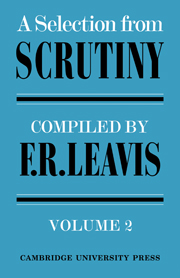7 - REVALUATION: JOHN WEBSTER
Published online by Cambridge University Press: 04 August 2010
Summary
The effervescent enthusiasm of Romantic critics for Elizabethan drama is suspect to-day just as most Romantic poetry is suspect. Lamb and Swinburne and their imitators have been responsible for a great deal of cant and nonsense. In praise and dispraise they are fulsome, hyperbolical, often hysterical. Lamb is often positively embarrassing— witness his note on Act IV, sc. iv, of The Revenger's Tragedy, and he is always getting between us and the author (for many people his note on the torturing of the Duchess of Malfi has become almost part of the play). Swinburne, like some Soviet shock-trooper exhorting feeble comrades, batters and bullies us into thinking every playwright a demi-god, yet he leaves us tired and bewildered, no better fitted to read these playwrights with more informed enjoyment. Some kind of reaction against this uncritical adulation was bound to set in and William Archer's lively attack must have been welcomed by many readers just because it did attack. Yet The Old Drama and the New is deplorably beside the mark. In drama Ibsen has no absolute value and to demonstrate that Elizabethan plays bear no resemblance to his plays tells us little about their merits or defects. For Archer, drama is ‘ the faithful reproduction of the surfaces of life and of individual refinements of character—we can recognize as good, in harmony with an inevitable tendency, any abandonment of exaggerative, in favour of soberly imitative, methods. The task that reason prescribes to the dramatic artist is to exhibit character by the same means by which it manifests itself in real life.’
- Type
- Chapter
- Information
- A Selection from Scrutiny , pp. 192 - 201Publisher: Cambridge University PressPrint publication year: 1968



